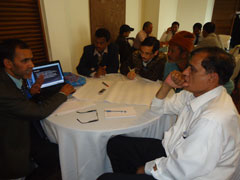
Group discussion on technology with local experts in Patna, Bihar. Source: IFPRI
Both workshops brought together local experts to identify promising technologies that could improve the livelihood and economic security of households dependent on agriculture. Focusing on the potential for accelerated dissemination, technologies for the following sectors were discussed:
- Rice, Maize and Pulses
- Fruits and Vegetables
- Fisheries and Livestock

Shri Debi Prasad Mishra, State Minister of Agriculture, Govt. of Odisha, inaugurates the Bhubneshwar workshop. Source: IFPRI
In Bhubaneswar, the workshop brought together policymakers, researchers, private sector actors, and students. Shri Debi Prasad Mishra, State Minister of Agriculture, Government of Odisha, inaugurated the workshop and emphasized that increases in agricultural investment, with a focus on higher productivity, market linkages and diversification are important factors in his government’s policymaking, especially when considering inclusive and sustainable growth. While Arvind Padhee, Revenue Divisional Commissioner, Government of Odisha, stressed incorporating climate change impacts at the micro level, along with the need for stress resistant varieties and higher resource allocations for climate resilience in agriculture.
At the Bihar workshop, Dr Mangla Rai, Senior Advisor to the Chief Minister of Bihar, delivered the keynote address, emphasizing agricultural sectors, like fisheries, that have the potential to produce high economic returns. He noted that investment in infrastructure, especially in storage and warehousing, would reduce waste while private investment in the processing sector could open new avenues for development.
Dr. Devesh Roy, the project lead and a research fellow at IFPRI, spoke briefly about the project’s scope and outlined this year’s work plan. He emphasized the project’s location-based approach which identifies sub-regional or district level areas where technology assistance is needed, instead of choosing the type of technology first and then identifying outlets for its application.
Dr. P. K. Joshi, IFPRI’s South Asia Director, introduced a two-year study which will be based on suggestions from the workshops and other expert input. The information will be followed by field surveys and, later, will link policymakers and other stakeholders who aim to improve the economic security of families living in marginal areas.
Initiated by IFPRI and the Center for Development Research (ZEF Bonn), the project, “Ex-ante technology assessment and farm household segmentation for inclusive poverty reduction and sustainable productivity growth in agriculture (TIGA)” focuses on the states of Odisha and Bihar in India in addition to Bangladesh, Ethiopia and Ghana.


